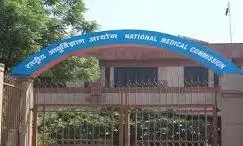
NMC reintroduces lesbianism as sexual offense in updated medical curriculum
text_fieldsThe National Medical Commission (NMC) has reinstated the classification of "sodomy and lesbianism" as unnatural sexual offenses within the forensic medicine and toxicology curriculum for undergraduate medical students.
This reintroduction marks a reversal from changes made in 2022, which were implemented in compliance with a directive from the Madras High Court.
In addition to the reclassification of these sexual acts, the updated curriculum also reintroduces topics such as the hymen and its various types, along with their medico-legal significance, and discussions on concepts like virginity, defloration, and legitimacy.
These subjects, once removed, have now been deemed necessary for inclusion once again.
The revised curriculum expands its legal education component to cover critical legal frameworks including the Bharatiya Nagarika Suraksha Sanhita (BNSS), Bharatiya Nyay Sanhita (BNS), and Bharatiya Sakshya Adhiniyam (BSA).
Additionally, it includes topics like the Protection of Children from Sexual Offences (POCSO) Act, distinctions between civil and criminal cases, the process of inquests (both police and magistrate-led), and differentiating between cognisable and non-cognisable offenses.
The curriculum also addresses various sexual behaviors, including fetishism, transvestism, voyeurism, sadism, necrophagia, masochism, exhibitionism, frotteurism, and necrophilia. However, distinctions between consensual sexual activities among queer individuals have been excluded, according to a source.
Significantly, the new curriculum omits the previously included seven-hour training on disability. The NMC stated that the curriculum revision was necessary to adapt to the evolving demographic, socio-economic context, and advancements in medical education, as well as to align with stakeholders' expectations.
In its Competency-Based Medical Education (CBME) Guidelines for 2024, the NMC emphasized the development of an outcome-driven curriculum that aligns with global trends. The revised approach focuses on the integration of subjects both horizontally and vertically, while still maintaining the importance of subject-specific instruction and assessment.
The overarching aim of the undergraduate medical education program is to produce an "Indian Medical Graduate" (IMG) equipped with the necessary knowledge, skills, attitudes, values, and responsiveness to function effectively as a first-contact physician in the community, while also being globally relevant.
To achieve these goals, the curriculum is designed to ensure that the IMG is capable of providing primary care, and possesses the requisite skills for promotive, preventative, rehabilitative, palliative care, and referral services.























